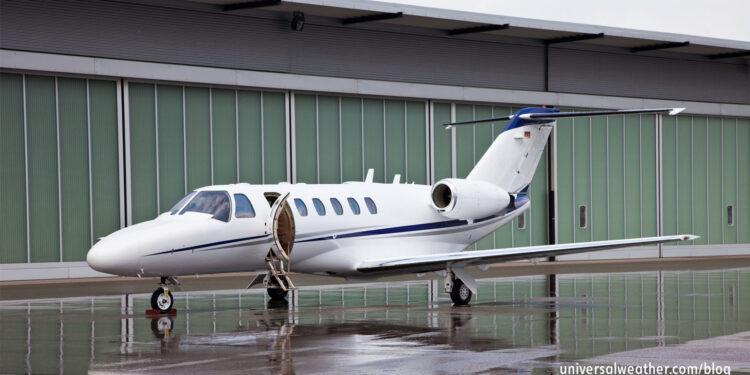Business Aircraft Operations in the UK: Ground Handling

This is a post by author Jason Hayward. Jason is general manager for Universal Aviation U.K. – London-Stansted. Jason is an expert on business aircraft operations in the U.K. and can be contacted at jasonhayward@univ-wea.com.
This business aviation blog post is part of a series on operating in the UK.
The UK is a common destination for business aviation operations. While UK ground handling services are of a high standard, advance planning and early notification of handling requests improve service options and help avoid unnecessary delays.
The following is an overview of what you need to know about arranging ground handling services in the UK:
1. Provide all required information for ground handling
When setting up UK ground handling, provide your full schedule, crew/passenger details, aircraft tail number/type, and requests for all required services. While short-notice service requests will be accommodated, you’ll have better options and less delay potential by providing as much advance notice as possible. For specialty in-flight catering requests – rare caviars for example – the more advance notification you can provide, the better. For locations with airport slot requirements, be aware that scheduled airlines have first priority, and slot options may be limited with short-notice requests. London Heathrow (EGLL), for example, operates at 98% capacity, and this severely limits airport slot availability. Parking can be more difficult to secure at some UK airports during peak season periods or during special events.
2. Consider airport restrictions
Few airports in the UK are 24-hour operations, and curfews usually exist based on time of day and aircraft noise levels. In some cases overtime is possible for arrival/departure earlier or later than published hours, but advance notice is needed. It’s important to be mindful of noise restrictions and curfews. At London Stansted (EGSS) for example your handler may not be able to arrange a night slot for Stage 2 operations.
3. Private and charter flights may be handled differently
Security screening regimes are in place for charter (non-scheduled commercial) flights with 19 or more seats each or Maximum Takeoff Weights (MTOWs) of over 10 metric tons each. These regulations require crew members/passengers to go through security screening on departure. If a charter flight has fewer than 19 seats or an MTOW of less than 10 metric tons, depending on the security zoning at your airport, the operator may not be required to comply with these security measures. Other than this security mandate – based on European Union (EU) directive EC300 – ground handling; services; and Customs, Immigration, and Quarantine (CIQ) are processed in the same way for both private non-revenue and charter operations.
4. Be aware of CIQ considerations
Landing cards must be completed by all non-EU passengers on arrival of any flight from outside the UK. Your ground handler can pre-fill out certain aspects of these forms. Crew members staying in the UK seven days or less and not flying into or out of the country commercially are not required to complete landing cards. However, if crew members will be staying longer than seven days and/or leaving the UK on a commercial flight, then they will need landing cards and visas, depending on nationalities. For inbound arrivals from outside the EU, customs clearance is needed, and each airport has its own requirements. CIQ at EGSS, for example, operates 24/7, and CIQ authorities like to have your information the night prior to your arrival so that they may check information in advance. At some UK airports, you may be able to clear onboard the aircraft or do a “remote clearance” where no physical clearance is necessary. It’s always, however, up to the officer on duty to determine which clearance procedure he/she will use. Most airports in the UK can be designated as airports of entry so long as advance notification is provided, and CIQ agrees to your clearance request.
5. Local regulations may impact the ground handling process
Local airport authorities determine regulations relating to ground handling. This may include allocation of parking stands, noise curfew, and noise abatement procedures, and policies on allowing passengers to remain onboard during aircraft fueling. Check with your local ground handler on all operating restrictions.
6. Schedule or manifest changes may impact handling services
While schedule changes do not normally impact the handling process, always advise your ground handler as to crew/passenger information changes so that any visa requirements can be determined, and CIQ can be similarly advised. CIQ is notified of all General Aviation (GA) flights, but typically does not physically check with regard to domestic operations. If you’re operating to/from the Channel Islands or the Isle of Man, however, you’ll need to fill out a landing card, and this will be forwarded to CIQ for record purposes.
7. Know ground handing costs and airport fees
Depending on the airport, ground handling costs and capabilities may vary considerably. With prior arrangement your ground handler will be able to settle airport fees on your behalf. Airport charges typically include landing, ramp, and parking fees. UK passenger departure taxes (UK APD) have been in effect for GA since April 1, 2013. Ramp and parking fees in the UK are generally calculated based on MTOW. At Farnborough (EGLF), however, these fees are based on wing span. Your ground handler will be able to provide on request estimated cost invoices covering all handling, airport, and service fees.
8. Additional reading: “Business Aircraft Operations in the UK” series index
Links will be added as new articles are published.
- Part 1 – Ground Handling
- Part 2 – CIQ
- Part 3 – Airport Slots
- Part 4 – Permits and PPRs
- Part 5 – Fuel and Security
- Part 6 – Flight Planning, Weather, and NOTAMs
- Part 7 – Culture and Hotels
Conclusion
Talk with your ground handler regarding local restrictions and operating limitations at your particular UK destinations. Costs will vary depending on the airport. It’s always good practice to request a handling and services cost quote during the trip planning process.
Questions?
If you have any questions about this article or would like assistance planning your next trip to the UK, contact me at jasonhayward@univ-wea.com.
Later, we’ll discuss CIQ for the UK and its impact on your trip.




